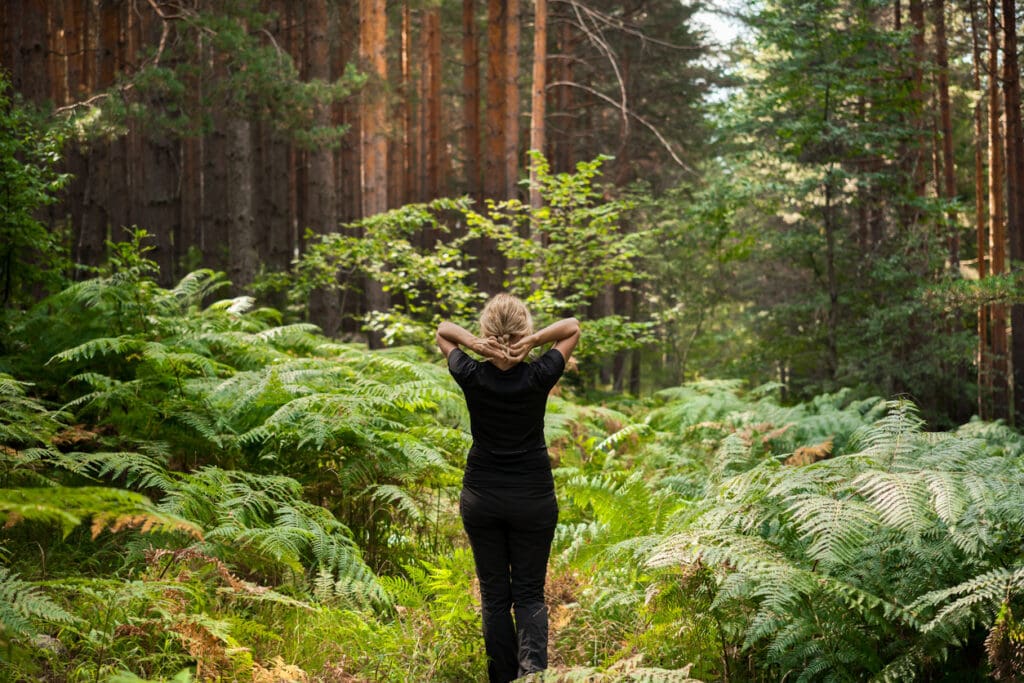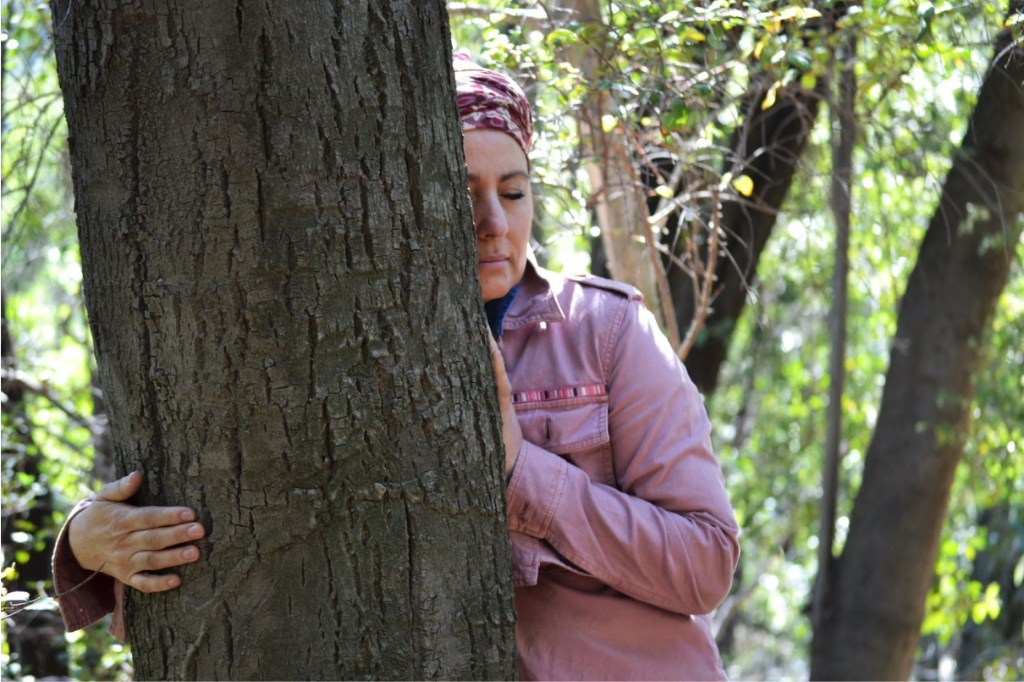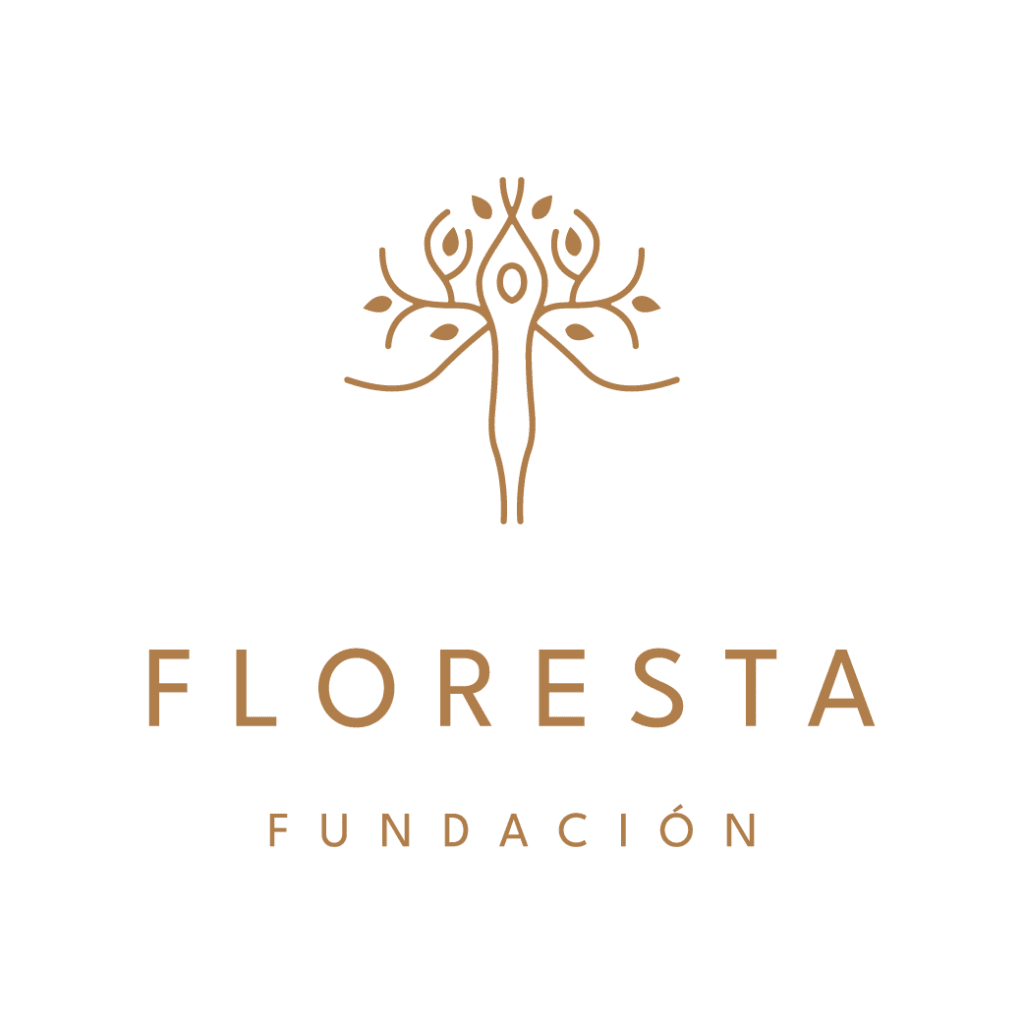
Mind & Life periodically invites guest writers to contribute to the blog. In this post, a Mind & Life Contemplative Changemaking grantee shares her experiences and insights gleaned through the grant.
In 2018, I was diagnosed with cancer. From then on, I chose to complement my medical treatments with a deep connection to nature and contemplative practices. I was inspired by what I had read about the health benefits of forest bathing and by my own lifelong bond with the natural world. Walking in the forest became my refuge—a space where I could reconnect with my inner wisdom and begin to reframe the experience of illness into a journey of personal transformation.
After making a full recovery, I wanted to share this healing connection with nature with others facing cancer. In 2019, I trained as a Forest Therapy Guide in Costa Rica through the Association of Nature and Forest Therapy (ANFT). That same year, I founded Fundación Floresta, a nonprofit organization that offers free forest therapy sessions to oncology patients. The Foundation’s integrative approach is grounded in ecopsychology and contemplative practices and is supported by a team of healthcare professionals who are also ANFT-certified Forest Therapy Guides.
In 2023, the Foundation was awarded a Contemplative Changemaking Grant from the Mind & Life Institute to offer free forest therapy sessions for cancer patients in socioeconomically vulnerable situations, who were receiving care in public hospitals in the Metropolitan Region of Santiago, Chile. Over the two-year duration of the grant, we were able to reach 432 cancer patients and healthcare workers.
Forest therapy walks, approached from a holistic perspective, provide a space for physical, psychosocial, emotional, and spiritual well-being. Through this contemplative practice, the project sought to promote the cultivation of compassion and emotional connection with nature, while also inspiring pro-environmental behaviors.
“Forest therapy walks, approached from a holistic perspective, provide a space
for physical, psychosocial, emotional, and spiritual well-being.“
Collaborating Through Systems
To be successful, we needed to collaborate with larger-scale systems, including the national park service and hospital system. We signed an agreement, for example, with Corporación Nacional Forestal, or CONAF (Chile’s National Forestry Corporation), the governmental body in charge of the national system of protected natural areas. Thanks to this partnership, participants gained free access to the national park where the sessions took place. This alliance was key to overcoming a major obstacle encountered at the start of the project, when the cost of park entry posed a financial barrier for most patients. The agreement ensured the project’s continuity and guaranteed equal access to the therapeutic benefits of connecting with nature.
The collaboration also sought to foster a relationship between the community and the park, aligned with CONAF’s mission. Said CONAF Park Ranger Catalina Parra, “Forest Therapy offers significant benefits to human well-being. It’s also a path toward conservation. As people become more aware of nature’s generosity, they begin to value and protect these spaces and become active participants in their care and preservation.”
Similarly, we established a collaborative partnership with the oncology unit at Sótero del Río Hospital, the public healthcare center that serves the largest number of cancer patients in Chile. The sessions were offered to complement traditional treatments through an integrative approach, primarily to support mental health and strengthen the immune system of cancer patients. Despite their initial commitment, the intense workload and demands of the hospital environment made it difficult for nurses and medical teams to refer patients for walks. We had to rethink our outreach strategy, strengthening our collaboration with patient organizations and including patients from other public hospitals as well. We also decided to invite healthcare professionals to participate, recognizing the emotional and physical demands they face. The sessions were well received, which encouraged medical teams to refer their patients more readily to the walks being organized by the Foundation twice a month.
“Working in oncology means navigating a space of deep vulnerability, where one is in constant contact with both physical and emotional pain,” said Camila Horta, an oncology psychologist. “Forest therapy has a meaningful purpose in supporting those of us who care for others. Through contact with nature, we are given the chance to pause and turn our attention inward—to our own hearts that are always in service. It allows us to feel part of something greater—a larger whole in which we, and those we accompany, are deeply interconnected.”
“It [forest therapy] allows us to feel part of something greater—a larger whole
in which we, and those we accompany, are deeply interconnected.”
— Camila Horta, oncology psychologist
We also collaborated with the academic community, conducting a qualitative study on the impact of forest therapy on women with breast cancer in partnership with El Instituto Milenio para la Investigación en Depresión y Personalidad (Millennium Institute for Research in Depression and Personality, or MIDAP), a center affiliated with the Schools of Medicine and Psychology at both Pontificia Universidad Católica de Chile and the Universidad de Chile. Our hope is that the findings, expected to be published later this year, will offer valuable insights into the role of nature-based therapies in cancer care, with the potential to inform future health and wellness strategies in both clinical and public health settings.
Forest Therapy: Benefits for Mental Health and Well-being
According to scientific evidence, forest therapy has the ability to reduce stress levels, balance blood pressure, and strengthen the immune system. Among oncology patients, it has also been shown to decrease symptoms of depression and anxiety, alleviate chronic pain, and enhance overall psychological well-being (Han, Kim, & Lee, 2016; Kim et al., 2015; Li et al., 2007; Li et al., 2008; Park et al., 2010).
One study by researchers in Australia explored how experiences in nature affect people with cancer, finding that natural environments serve as a form of emotional support. After participating in ecotherapy sessions, patients reported feeling held by the earth—supported, accompanied, and embraced by nature. This experience helped ease their suffering, shift their perspective on illness, and activate resilience-based coping strategies. They also described reconnecting with a slower rhythm, in contrast to the fast pace of city life and the anxiety associated with medical treatments.
The Forest Therapy Experience and Impact
The forest therapy sessions consisted of a slow, contemplative four-hour walk, during which each guide offers a series of open-ended invitations or prompts designed to engage the senses and foster an emotional connection with nature. Based on our experience implementing the grant, most participants with cancer described the forest therapy sessions as transformational—reshaping their relationship with the illness and strengthening their resilience.
Participants often emphasized that the therapy helped them connect with an internal space of calm and equanimity, allowing them to observe their emotions with greater clarity and hold space for their vulnerability. According to studies, this effect arises from a bodily anchoring through the sensory perception of the natural environment and the emotional regulation promoted by stress reduction and conscious breathing. In this way, the experience of illness can be redefined from a place of greater awareness and openness.
Additionally, patients described feeling supported by nature and the group in an environment of trust and unconditional love. This sense of being “held” awakens self-compassion, facilitates self-forgiveness, and encourages a loving attitude toward oneself.

“I was lucky to find the forest at the beginning of my treatment; it was my first space of refuge and support,” said Maria, a program participant. “The forest told me, through the experience of being and presence, that everything was going to be okay. With warmth, it invited me to embrace and accept reality with love and compassion.”
Maria continues to benefit from the training and exposure she received. “Today, the forest is a bond for me,” she says, “a friend I can trust and rest with. It offers active listening without judgment, without the urgency to fix anything, because there’s nothing to fix in a place where the mind quiets and the heart connects.”
The experience can also awaken a growth mindset, from which small, meaningful actions emerge to reinforce self-confidence. Reframing illness as an opportunity for transformation and personal development often leads participants to take an active role in their healing process, expressing the desire to adopt lifestyle changes, maintain self-care practices, and sustain an ongoing connection with nature.
When she first tried forest therapy, Carla was recovering from thyroid cancer surgery and struggling with a deep depression caused by the hormonal changes that followed. “It was hard to imagine going on living; every day felt like a struggle,” she says, adding “My first experience was so much more than I expected. I felt like I could enjoy simple things again—like the air on my face, the smell of damp earth, and the colors of a forest that hadn’t yet bloomed. It helped me remember who I was before cancer, and to see that there was still life after it.”
“It [forest therapy] helped me remember who I was before cancer,
and to see that there was still life after it.”
— Carla, program participant
Finally, many report that after being in the forest, they feel part of something greater. Becoming aware that we are not isolated beings but part of an interconnected web of life awakens a transcendent and spiritual dimension to the practice. This awareness can translate into a sense of unity, compassion, and environmental consciousness. Personal suffering becomes a doorway to deeper connection—with others and with nature—nurturing a reciprocal relationship with the forest, grounded in gratitude, care, and mutual protection. In the words of ANFT founder Amos Clifford, “When we shift the way we see the world and our place in it, that new perspective enables us to form genuinely meaningful relationships that support our health and the health of all living beings.”
Next Steps
Over the coming months, we will develop a group workshop focused on cultivating resilience in the context of cancer through contemplative practices and ecotherapy. We hope to implement this initiative before the end of the year.
The data analysis continues for the academic research study conducted in collaboration with the MIDAP Institute. Once the study is complete, we will publish the results and share them with hospitals, patient organizations, and the broader public health community.
We also seek to advance scientific research on the benefits of nature-based interventions for people with cancer throughout Latin America. Toward this end, Fundación Floresta is a member of the Global Climate and Health Alliance for Latin America (GCHA), reflecting our broader commitment to planetary health.
We hope to continue contributing to the profound challenge—and opportunity—we face as humans: to transform the concept of health by fostering a dialogue between science and ancestral wisdom. Contact with nature not only opens the door to healing, but reminds us of the path back to what is essential.
Gabriela Iglesias is a Clinical Psychologist and Ecotherapist. She founded Fundación Floresta and serves as its Executive Director.
Looking for more insights into the mind and human flourishing? Subscribe to Mindstream, our monthly email newsletter, for more stories and news from the field of contemplative research.
References
Blaschke, S., O’Callaghan, C. C., & Schofield, P. (2017). The role of nature in cancer patients’ lives: A systematic review and qualitative meta-synthesis. BMC Cancer, 17, 370. https://doi.org/10.1186/s12885-017-3366-6
Clifford, A. (2018). Your guide to forest bathing: Experience the healing power of nature. Red Wheel.
Han, K., Kim, J., & Lee, H. (2016). The effects of forest therapy on coping with chronic widespread pain: Physiological and psychological differences between participants in a forest therapy program and a control group. International Journal of Environmental Research and Public Health, 13(3), 255. https://doi.org/10.3390/ijerph13030255
Kim, H., Lee, J., Lee, M., Lee, H., & Lee, S. (2015). Effects of forest therapy on immune function in patients with breast cancer: A randomized controlled trial. Journal of Clinical Oncology, 33(15_suppl), e13004–e13004. https://doi.org/10.1200/jco.2015.33.15_suppl.e13004
Li, Q., Morimoto, K., Kobayashi, M., Inagaki, H., Katsumata, M., Hirata, Y., … & Miyazaki, Y. (2008). Visiting a forest, but not a city, increases human natural killer activity and expression of anti-cancer proteins. International Journal of Immunopathology and Pharmacology, 21(2), 117–127. https://doi.org/10.1177/039463200802100201
Li, Q., Morimoto, K., Nakadai, A., Inagaki, H., Katsumata, M., Shimizu, T., … & Miyazaki, Y. (2007). Forest bathing enhances human natural killer activity and expression of anti-cancer proteins. International Journal of Immunopathology and Pharmacology, 20(3), 3–8. https://doi.org/10.1177/039463200702000301
Park, B. J., Tsunetsugu, Y., Kasetani, T., Kagawa, T., & Miyazaki, Y. (2010). The physiological effects of Shinrin-yoku (taking in the forest atmosphere or forest bathing): Evidence from field experiments in 24 forests across Japan. Environmental Health and Preventive Medicine, 15(1), 18–26. https://doi.org/10.1007/s12199-009-0086-9


